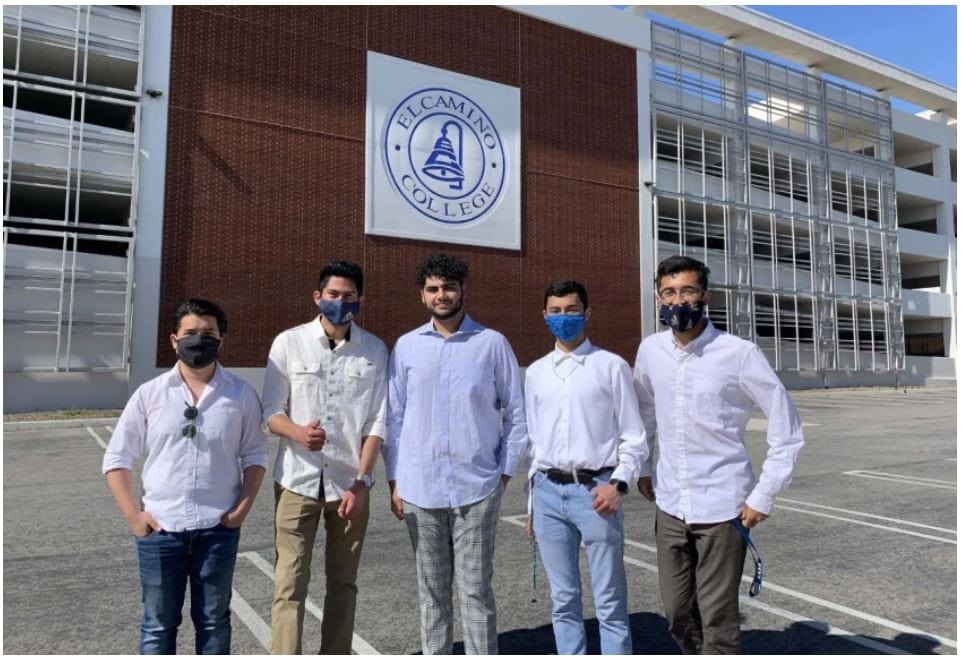A group of El Camino College STEM students is embracing the challenge of getting a new business off and running, while also pursuing degrees in engineering. Their specialized startup received initial funding from a $5,000 grant awarded earlier this year from the NASA Minority University Research & Education Project (MUREP) Innovation & Tech Transfer Idea Competition (MITTIC).
Designing a business plan, establishing succinct core ideas, and creating a company strategy are much different than their usual engineering work, so this science-minded group moved quickly to ace the learning curve and learn the lingo and processes involved in the business world. They managed to juggle their busy schedules to create a presentation for NASA executives and potential investors earlier this month.
“It is a bit difficult but it’s well worth it,” said Noe Servellon, an El Camino electrical engineering major. “A lot of our core work gets done during weekends, post-exam weeks, holidays, and wherever else we can squeeze in an extra hour. It’s a life-changing opportunity, and we do not want to miss it!”
Servellon was one of six El Camino students who participated in the competition this past spring that challenged teams from universities and colleges across the nation to create a product or service using NASA-patented technologies. Winning concepts were eligible to receive up to $10,000 in startup funding.
The El Camino team drafted a 14-page concept paper for a 3D printing business and was selected as one of eight finalists to present at a Space Tank virtual immersion experience at NASA Johnson Space Center. Designed as a “Shark Tank”-style competition, students pitched their idea to NASA engineers, and then finalists were selected based on innovation and creativity. Usually, teams travel to the NASA Johnson Space Center in Houston for the final competition; this year’s competition was held virtually due to the coronavirus.
The product is designed to bridge the gap between high-speed industrial fused deposition modeling (FDM) printers to consumer-grade printers at a reasonable price. This product will make high-quality 3D printers more accessible to the public and educational institutions.
“If everything goes as planned, it should be one of the fastest FDM 3D printers in the market,” Servellon said. “This product will also have the accuracy and precision similar to a surgical robot, yet easy to use and requires little maintenance.”
The goal of the competition is to build stronger relationships between Minority Serving Institutions (MSIs) and NASA, while enhancing STEM opportunities for students. Building a diverse STEM workforce by offering authentic learning experiences with NASA’s people, content and facilities is also an objective.
The El Camino College team competed against top university teams and was awarded $5,000 to launch their business. The team has since formed a partnership with Virginia Tech University through the Tech Center Research Park Accelerator Network Program, which led to an all-expenses paid trip to Virginia where the students gained entrepreneurial training as they continued to develop the product. The accelerator program allowed the El Camino team to collaborate and connect with investors and technology while gaining support as they develop their product.
“The accelerator is the first-of-its-kind in that it offers support directly from NASA to benefit the public and future entrepreneurs,” Servellon said.
The engineers-turned-entrepreneurs continue to learn as they go and are meeting production deadlines. Even though half of the El Camino team has since transferred to a university, the group perseveres, bringing everything together as they get ready to present the final product. Team member and electrical engineering major Moises Santander said they received valuable assistance from El Camino, including the support of staff and faculty such as professor Edwin Ambrosio, who served as the principal investigator and mentor while also offering encouragement and advice that helped shape the group’s concept paper.
“Even with the support, my team and I put the work in, from working in different time zones to accommodating everyone’s personal and academic schedule; we have all found a way get things done,” said Moises Santander, an El Camino electrical engineering major. “I appreciate that we have all been working toward the same goals, which are to advance the field of additive manufacturing and increase the accessibility of high-end 3D printers. I feel blessed to be part of such an inspiring and uplifting community and team. We have come a long way in a little over a year, and we are just getting started.”
El Camino team members include Faizan Darsot, mechanical engineering, University of Michigan; Brady Fernandez, machine tool technology, (MITTIC phase); Alexander Lopez, mechanical engineering, CSU Los Angeles; Mohammad Pasta, civil engineering, UC Berkeley; Moises Santander, electrical engineering, El Camino; and Noe Servellon, electrical engineering, El Camino.
Subscribe to AM Chronicle Newsletter to stay connected: https://bit.ly/3fBZ1mP
Follow us on LinkedIn: https://bit.ly/3IjhrFq
Visit for more interesting content on additive manufacturing: https://amchronicle.com


